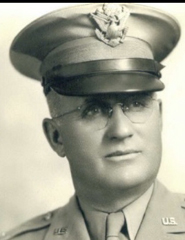Frank Miles Visits Grave of Son, Talks to Buddies
Sees Plane, in Which Bill Had Died, Take Off for South France
EDITOR'S NOTE: This is the first oversea's article in a series by one of the Globe-Gazette's war correspondents, Frank Miles.
By FRANK MILES (Iowa Daily Press War Correspondent)
Somewhere in the Mediterranean War Theatre, (IDPA) -- My 21 year old son, 2nd Lt. William B. (Bill) Miles, a Liberator first pilot, and his young expectant wife, nee Kathleen Whitehead of West Helena, Ark., came to my home in Des Moines to see his mother and me shortly before he flew overseas for combat. None of us shed tears at the parting. He and I shook hands with an exchange of "so longs', he kissed his mother, climbed into his car and was off with a smile and a wave. Soon cheery air mail and V-mail letters came form him in Africa and then in Italy. He was always good about writing.
About the middle of May, when I learned I was coming across as a war correspondent for American Legion publications, I wrote him I might see him shortly and jokingly added he might bring me home as a passenger. He never read the letter. It was returned June 10, marked "deceased."
On June 1 came a message that he had been killed in action May 17. Later we learned it was from flak in a raid over Elba, that his co-pilot, 2nd Lt. Cal Lindsay, of Lamberton, N. Car., who only had been scratched by the burst, had flown the plane back to base, and that my son had been given a Christian, military burial in a U.S. Cemetery in Italy the following day.
On Aug. 13 when I was planning to go see his grave I happened into a conversation with Col. R. A. Warner of San Francisco, who was on duty there.
"When you arrive, phone my office and tell them to provide you with a car and driver," the colonel said.
I landed there in a plane the next day, followed Col. Warner's instructions. A driver with a jeep was at the port for me in a few minutes.
About sunset that evening I walked bareheaded and alone in among the rows of graves and found one I had come to visit. I knelt down and talked through the Lord to him and his comrades sleeping there and elsewhere, then I arose and saluted him and all of them and departed with pride and contentment in my broken heart.
To loved ones of those who have made the supreme sacrifice for America in this war and who read this, I assure you that the government, through picked officers and men, takes excellent care of bodies and cemeteries. I was deeply impressed with Capt. Richard B. Coombs, of Boston, Mass., who was in command of the company in charge of the plot where Bill rests.
I happened to meet Lt. Don Smith, of Portland, Ore., a tall, kindly young officer. When I told him I should like to visit Bill's buddies at the base from which he had gone on his last mission the lieutenant immediately obtained for me a car with a driver for the 78-mile trip. We reached the destination and I spent 3 hours talking with Major James P. Lyle, Denton, Texas, who was on the opposite wing from Bill on my son's fatal flight and others of his surviving friends.
Next morning I saw 36 heavy bombers take off in 30 minutes to participate in the allied invasion of southern France. After that I saw the plane in which Bill had lost his life. His name had been removed from its side.
A few minutes later Lt. Elvin Brush of California, who was one of Bill's best buddies, informed me he was about to fly to the city from which I had set out and invited me to come along. Of course I accepted.
I shall ever be softened by thoughts of Colonel Warner and Lieutenants Smith and Brush. Fighting men, yes, but men with hearts as tender as a child's to a grief-stricken father who in those hours sorely needed such help as they accorded.
And now I believe I know, better than ever before, why America must defeat our enemies and do honorably whatever may be needed to prevent involvement in another world cataclysm.
Source: The Mason City Globe-Gazette, August 29, 1944
![]()

